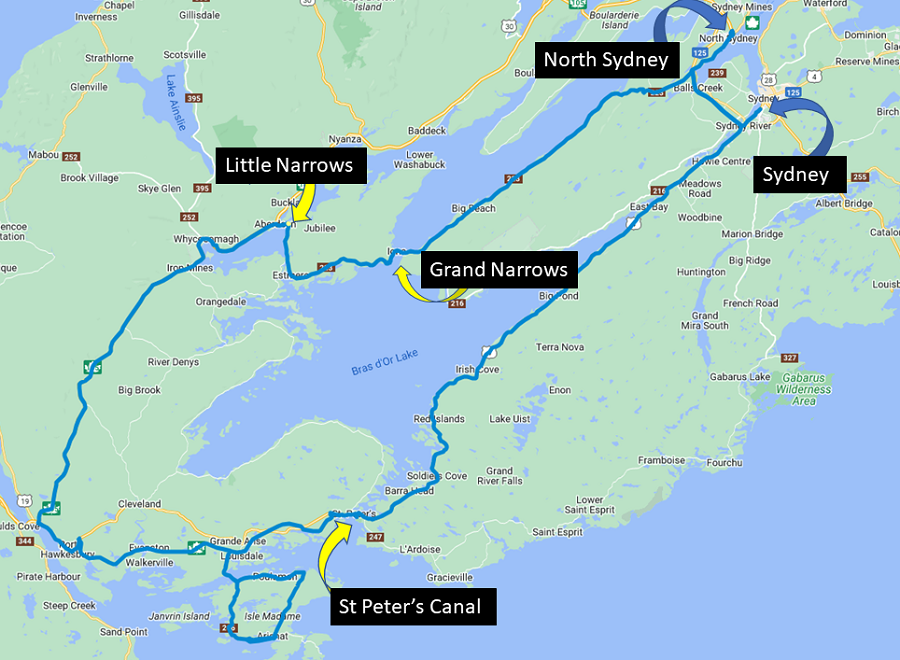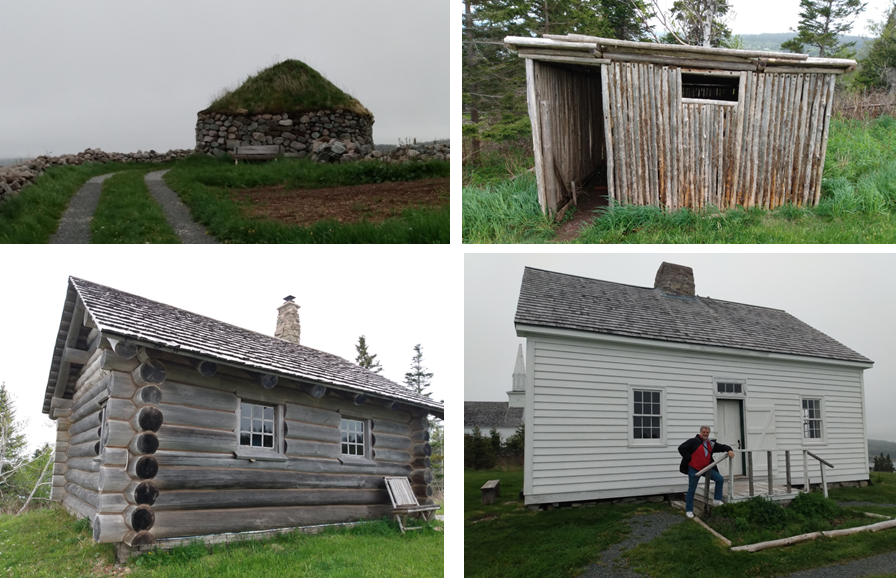

Rob-n-Hild, Eastward Ho!
Click links to jump to specific days:
Start | Nerdy
| Largest
| Stranger Things
| Stairs Stairs Stairs
|
|||||||||||||||||||||||||||||||||||||||||||||||||||||||||||||||||||
|
Port aux Basque - Sydney 179 km sailed in 6:51 hours. 348 km driven in 4:55 hours. Elevation maximum 143 metres) 
|
|||||||||||||||||||||||||||||||||||||||||||||||||||||||||||||||||||
| The ferry left Newfoundland just after midnight, with Hild and Rob already dozing in their recliner seats. We had a nice view from our seats as the dawn broke and we could see how many trucks they had squeezed on board. You can also see how smooth the sea was as well, luckily for us. Not much happened after that until we docked and - being on the very bottom - we were the last ones to get off. While we waited, Hild had scoped out the nearest Tim Hortons and we were there for our standard Saturday morning breakfast (12 grain bagels, toasted with extra butter) - not quite realising that this was in fact Sunday! | |||||||||||||||||||||||||||||||||||||||||||||||||||||||||||||||||||

|
|||||||||||||||||||||||||||||||||||||||||||||||||||||||||||||||||||
| As it was still only 8.30 am and we had a hotel booked with a 3 pm check-in, we decided to take a drive around Cape Breton Island. More specifically, we drove around Bras d'Or Lake which sems to make up most of the center of the island! It was a fun trip with some surprising places we were not expecting - so it took a bit longer than planned to get to our hotel. | |||||||||||||||||||||||||||||||||||||||||||||||||||||||||||||||||||

|
|||||||||||||||||||||||||||||||||||||||||||||||||||||||||||||||||||
| Bras d'Or lake is open to the ocean through a narrow channel at the top, close to Sydney and at the bottom is a canal allowing boats to exit into the narrows separating Cape Breton island from the rest of Nova Scotia. There is just a small piece of land at the bottom and the indigenous tribes used to carry their canoes over. An early settler set up a business hauling boats over the land using a wooden track, but in the 1850's a canal was built. The canal needs quite clever double locks because the tides in the sea are not matched in the lake and sometimes the water level is higher on the sea side and sometimes on the lake side. | |||||||||||||||||||||||||||||||||||||||||||||||||||||||||||||||||||
| We had lunch at Arichat overlooking the lighthouse on Jerseyman Island as we drove around an island called Iles Madames which has a former cathedral. This poor guy was demoted to being a normal church when the diocese was expanded and the seat was established in a different city. How sad, to be a demoted church. Anyway, after that we drove up to Little Narrows where the dinkiest little ferry runs back and to across about 150m of water. We had tried to find a schedule and prices, but it turns out there are neither! The ferry runs all day, whenever there is a vehicle and there is no charge - the costs are covered by the community because the alternative is about a 100 km detour. | |||||||||||||||||||||||||||||||||||||||||||||||||||||||||||||||||||

|
|||||||||||||||||||||||||||||||||||||||||||||||||||||||||||||||||||
| A bit further on from Little Narrows is Grand Narrows (which has a bridge!), but just before we crossed we stopped at the Highland Village Museum, which turned out to be very interesting. The orginal wave of settlers to Nova Scotia in the 1750's were farmers from the Western Iles of Scotland and there is a strong movement among their descendants to retain the gaelic language and culture so they have built a museum village. The houses go from the stone cottages in Scotland, through the simple shelters built when they first arrived, to the wooden cabins and then proper houses as they established farms. There was lots more, but we didn't have time to do it all as in each of the buildings there was a person playing in character and we spent a lot of time talking to each of them! | |||||||||||||||||||||||||||||||||||||||||||||||||||||||||||||||||||
| Coming up: Louisbourg or the Cabot Trail... | |||||||||||||||||||||||||||||||||||||||||||||||||||||||||||||||||||
Start
| To Previous Day
| To Next Day
| Nerdy
| Largest
| Stranger Things
| Stairs Stairs Stairs
May/June 2023
May/June 2023

